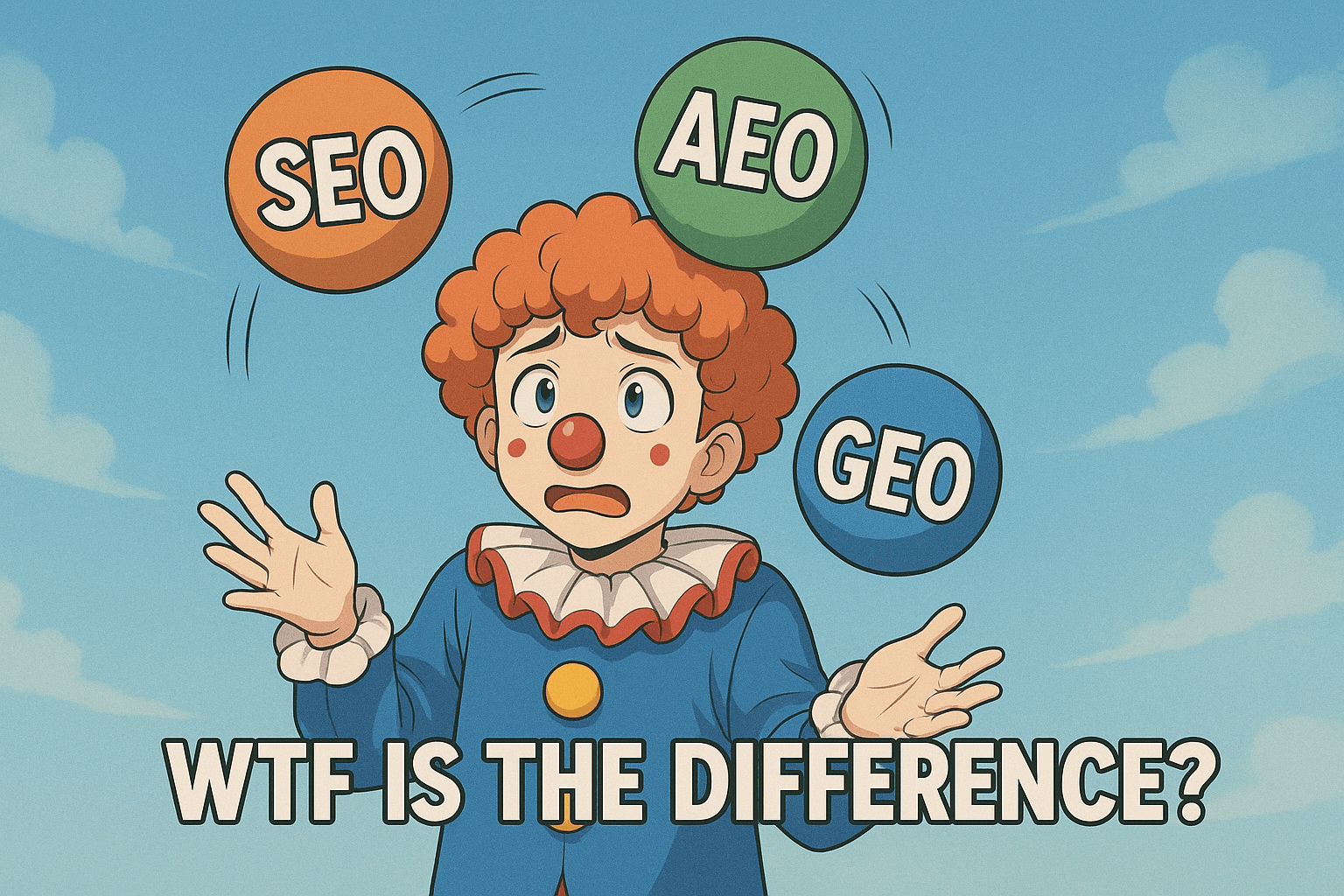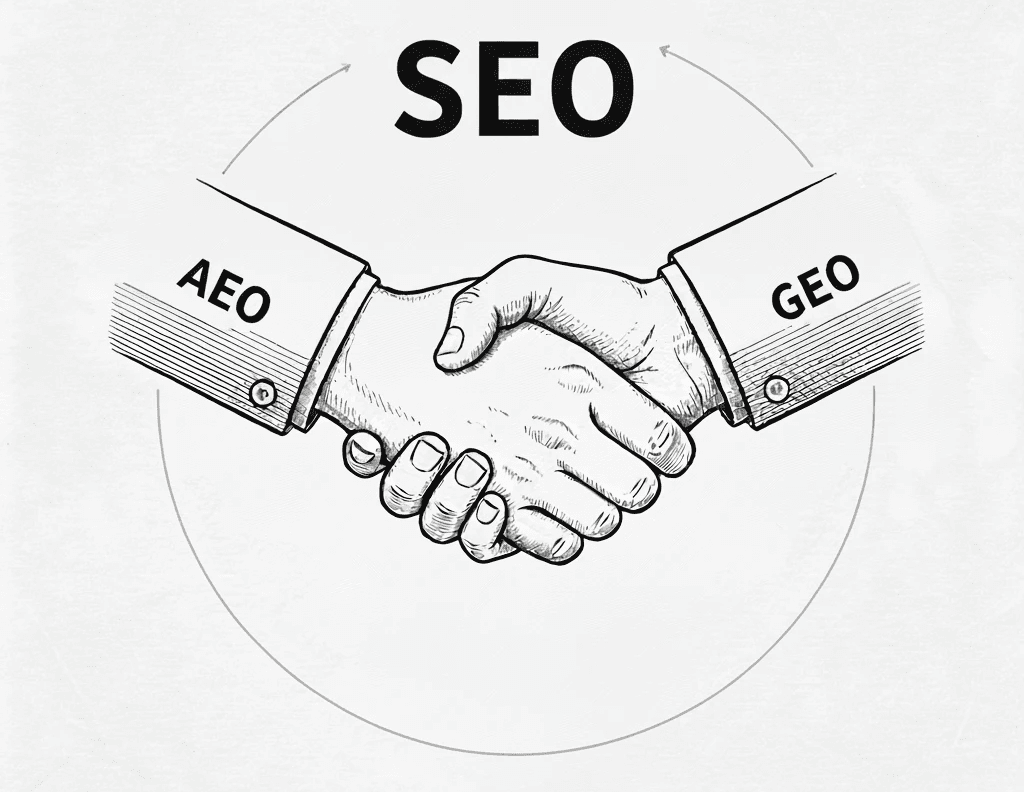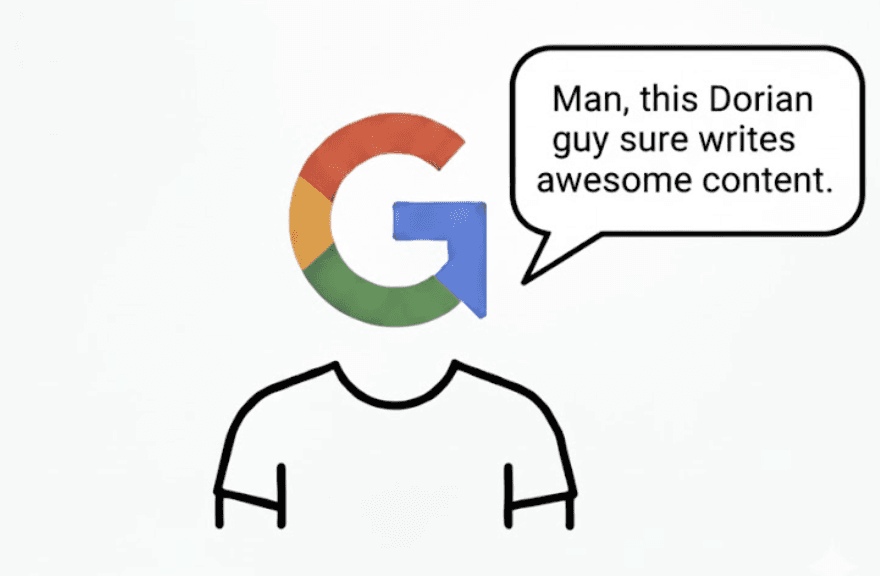The digital marketing industry invents new 3-letter acronyms every few quarters, and there's a familiar, almost frantic energy behind them.
SEO, AEO, GEO...
It's a continuous cycle of jargon designed to make old problems sound new.
But the core discipline of being discoverable on Google Search hasn't actually changed since the first person typed a search query.
The goal has always been to be the most authoritative source of truth for a given query.
And it always will be.

The evolution of search: How did we get here?
In the last few years, search has moved faster than at any other point in my career. To understand why so many marketers feel panicked, it helps to see how we got here.
Search Engine Optimization (SEO) used to be straightforward: keywords, backlinks, rankings.
You ranked, people clicked, and traffic flowed.
Then came Answer Engine Optimization (AEO), an adaptation to Featured Snippets, Voice Search, and voice assistants like Google Assistant.
Google search results evolved from pointing you to a page to giving you the answer directly in an Answer Box.
This required a different content creation structure:
Structured data
Markup
Clear question-based headings
Brevity above all
If you couldn't be concise and accurate, you lost the snippet. This ushered in the era of zero-click search experiences.
The natural progression brought us to Generative Engine Optimization (GEO), which has marketer's optimizing content so it gets cited by LLMs and AI-driven search engines.
Rather than optimizing for an algorithm's ranking calculation, you're now optimizing for an AI's synthesis of information. It's about being chosen as a source for the AI-generated answers, not just the blue link.
So now the common narrative says you need to manage three layers:
Win the traditional link for website traffic with SEO
Win the snippet with a direct answer with AEO
Win the citation in the summary for brand mentions with GEO
No wonder people are panicking. It sounds like you need three separate, sophisticated strategies.
What's the diference between SEO, AEO, and GEO?
Here's what almost nobody talks about: the strategic differences between these three are smaller than the marketing suggests. They're not three distinct disciplines.
SEO, AEO, and GEO are 3 different lenses looking at the same piece of content.

Think about what each framework actually demands:
What does your content need to rank in traditional organic search?
It must be relevant to keywords and backed by credibility.
What does your content need to win a featured snippet?
It must be the most concise, accurate answer available.
What does your content need to be cited by an Artificial Intelligence (AI) model?
It must demonstrate authority and use clear, natural language processing structure so the machine learning system can parse and quote it accurately.
The requirements converge on the single, unwavering principle of trust and authority.
Let's look at where the tactics overlap:
Structured data powers all three
AEO demands formatted answers (FAQ, How-To). GEO relies on clear headings and direct answers so LLMs can parse and synthesize. SEO benefits from that same clarity for crawler optimization.
Authority signals matter across the board
SEO buillds authority through backlinks. GEO explicitly prioritizes E-E-A-T (Experience, Expertise, Authoritativeness, Trustworthiness) and brand consistency across the web.
Both feed into the same principle of demonstrable credibility.
User intent is central to all three
SEO matches keywords to intent.
AEO answers the question behind the query.
GEO handles conversational search complexity.
But they're all trying to solve the same problem: What does this person actually need?
If you create high-quality content that directly answers a reader's query with demonstrable expertise, and organize it for both human and machine consumption, then you're already doing SEO, AEO, and GEO simultaneously.
When this clicked for me, I stopped asking "How do I optimize for the newest engine?"
And started asking the only question that ever mattered:
"What is the clearest, most credible answer to the reader's question, regardless of which AI search engine they use?"
Most marketers focus on outputs like ranking, featured snippets, and citations. But we control the input.
Whether an algorithm is ranking blue links or an AI is synthesizing a search overview, it's always attempting to find the most trustworthy, efficient answer for the user.
The real shift happening isn't from one optimization to three. It's from optimizing for keywords to optimizing for retrieval and credibility.
This kind of work is quieter and more demanding. It moves away from the cliché digital marketing hustle toward intellectual rigor. It requires you to build something a powerful brand and a definitive answers worth citing.
The metrics have changed, but the core principles have remained the same
The acronyms are ultimately less about strategy and more about tracking a shift in what we measure.
We're measuring brand mentions and citation frequency instead of click-through rate.
We're measuring the quality of the answer, not the proximity of the link.
I've seen enough data to know that if your content is credible enough for an AI-powered search engine to cite as a definitive source, it will also rank in traditional search and win the answer snippet.
The real blocker is execution
Creating great content that can simultaneously rank traditionally, win the featured snippet, and be synthesized by large language models requires a specific skillset.
You need to understand:
Semantic Depth: Structuring content not just for keywords, but for the concepts and context an AI needs for accurate synthesis.
Technical Precision: Implementing structured data and clear headings that satisfy both traditional crawler optimization and the parsing needs of modern generative engines.
Audience Authority: Ensuring the tone and expertise of the writing establishes the trust signals (E-E-A-T) necessary for a definitive citation.
It's one thing to know the theory, but consistently producing the input that guarantees the output is another animal entirely.
Does your business need more visibility in AI search?
Are you looking for someone who can boost your organic search rankings, capture the AI answer box, and ensure your brand is cited as a trusted source?
My SEO content writing service can help your business get found in this unified search landscape.

If you have less than 2000 high-quality inbound website visitors per month, it's highly likely that you'll see fast results from our partnership.
Send me a message to get a custom plan tailored to your business and budget.
Like this article? Share it with a friend.


